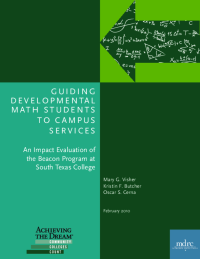Guiding Developmental Math Students to Campus Services
An Impact Evaluation of the Beacon Program at South Texas College
This report presents results from a rigorous evaluation of the Beacon Mentoring program, designed and implemented by South Texas College, in McAllen, Texas. As part of their participation in the Achieving the Dream initiative, college leaders developed an innovative intervention targeting students enrolled in lower-level math courses that have high rates of failure. The program was based on three simple ideas: that students who need services often do not access them even when they are available and free; that a mechanism is needed to alert student services staff when students start to fail in class; and that students need a "go to" person on campus who knows them and to whom they can turn for advice, support, and information.
The Beacon Mentoring program was a "light touch" intervention, designed to serve large numbers of students at minimal cost. Mentors were college employees who were recruited and trained to make several short classroom presentations about services available on campus and to work with the faculty to identify struggling students and offer them help early on. During spring 2008, the Beacon program targeted over 2,000 students enrolled in 83 sections of either a developmental (remedial) math course or a college-level algebra course. Mentors were randomly assigned to half of the sections. The impact of the program was assessed by comparing the outcomes of students in the mentored classes with the outcomes of students in the classes that were not assigned a mentor.
The program had no effect on passing the math class or on persistence. However, evidence suggests that the program had a modest and positive impact on other outcomes for the full sample of students and resulted in additional or more pronounced benefits for two subgroups of students most at risk of failure: students enrolled in developmental math and students who attended college part time. Analyses in this report show that:
- The program succeeded in increasing the number of students who used the Center for Learning Excellence, a campus resource that provided tutoring and other forms of academic support.
- The program led to a statistically significant decrease in the likelihood of students in mentored classes withdrawing from their math course before the end of the semester.
- Part-time students were less likely to withdraw from and more likely to pass the math class, earned more credits, and, at least in the developmental math classes, scored higher on the final exam. The program also resulted in enhanced benefits for students enrolled in developmental math classes.






